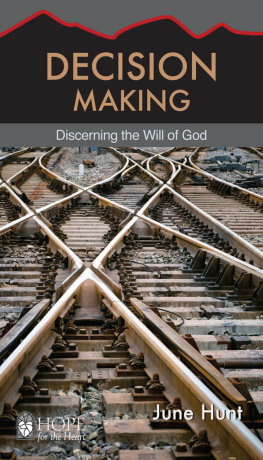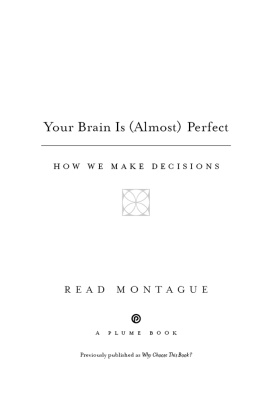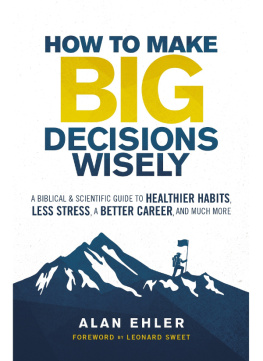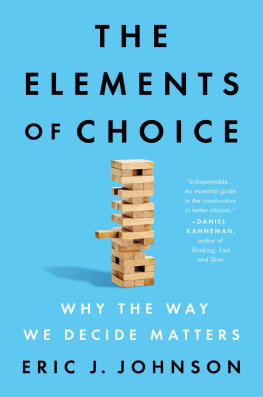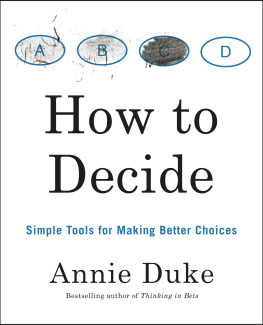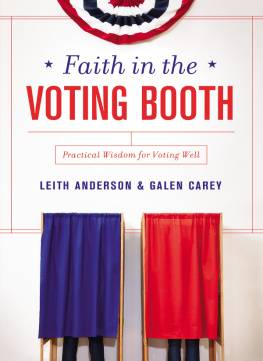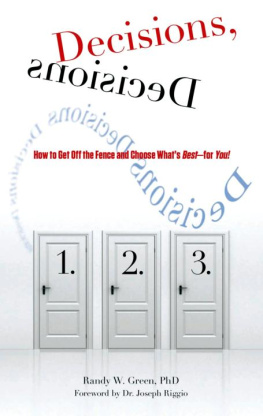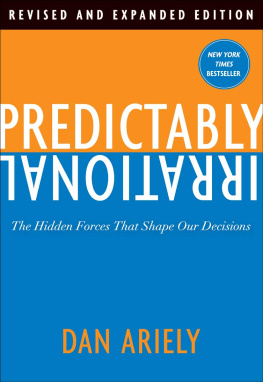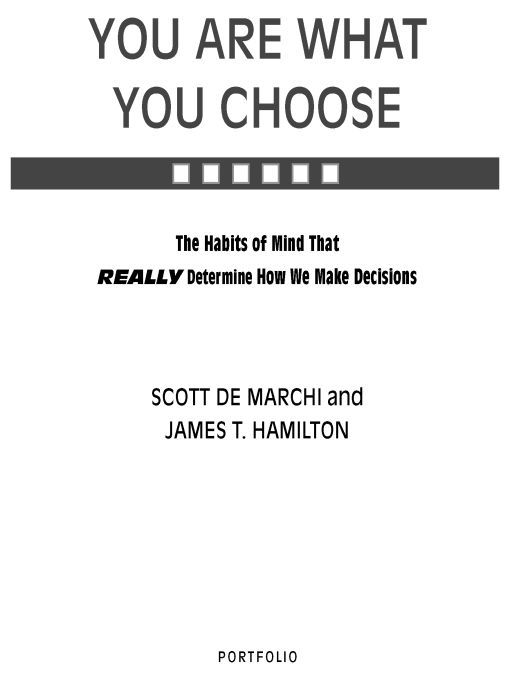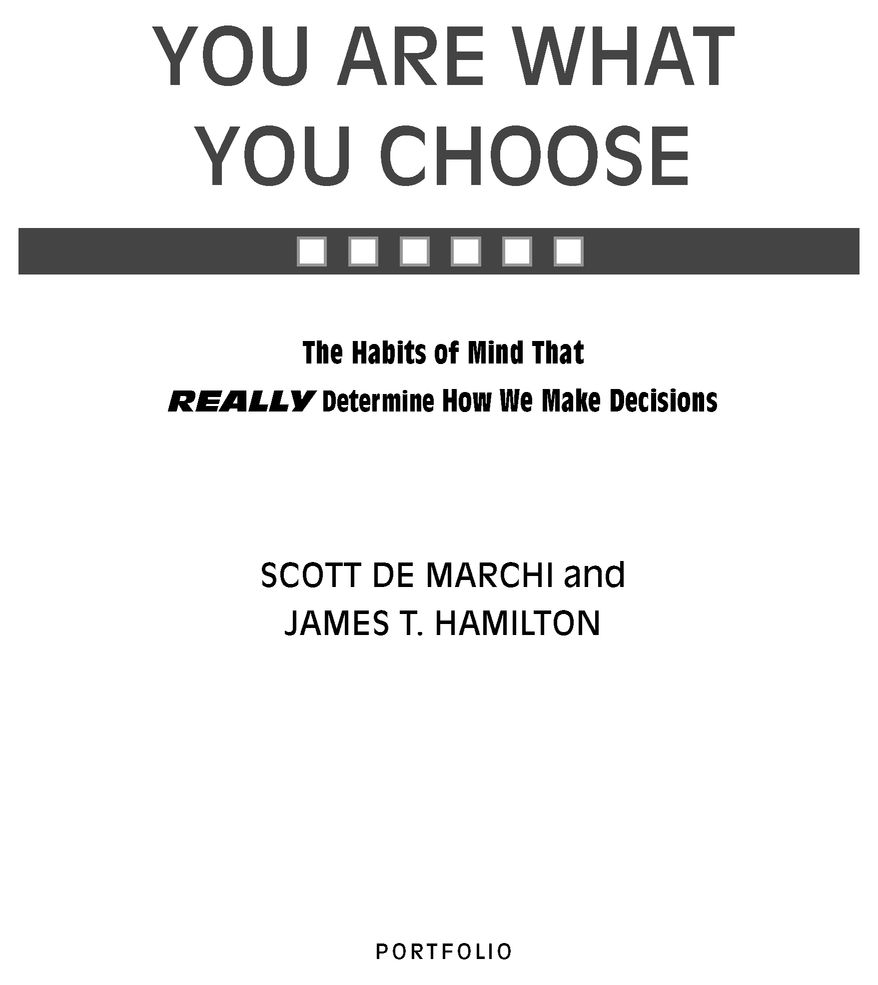Table of Contents
Acknowledgments
We met at a committee meeting at Duke. The topic was how to encourage more research by professors from different fields. Walking out of the meeting, we agreed that, instead of talking about the idea of interdisciplinary research, wed get together and actually do it. Our first paper looked at how to detect when corporate polluters might be underreporting what is actually coming out of their smokestacks. Writing that paper led us to detect something elsethe very different ways that we each approach decision making. Thinking about that question led us to write the book you are reading.
Getting this book published required someone who loves risks (since were new authors writing about new theories), enjoys information, and thinks about the future. That accurately describes our agent, Melissa Flashman. Melissa became an immediate fan of the TRAITS model and helped bring our ideas to a wider audience. David Moldawer, our editor, saved us from a multitude of sins: too many caveats, detours into data descriptions, and aimless anecdotes. For paragraphs without the passive voice, please thank him!
Many people gave us helpful feedback on the book proposal, including Donald Lamm and the Center for Advanced Study in the Behavioral Sciences (CASBS) class of 2008. We owe a great debt to mentors who pushed us over the years to do the interdisciplinary work that led to this project, including John Aldrich, Joe Kalt, Michael Munger, Scott Page, Sam Popkin, George Rabinowitz, Ken Shepsle, and Kip Viscusi. Kim Krzywy, Mattia Landoni, Jacob Montgomery, and Katherine Tiedemann provided excellent research assistance. The Center for Comparative Biology of Vulnerable Populations at Duke funded our work on environmental decision making. De Marchi benefited from support from the Program in Advanced Research in the Social Sciences at Duke. The CASBS provided Hamilton the academic equivalent of Nirvanaa year to write, with the chance to interact daily with colleagues who became close friends too. Finally, we would like to thank Jennifer Harrod, Russ Denton, Lyle Scruggs, and Justin Walker for reading early drafts of the book and providing thoughtful advice.
While the differences in how we approach child rearing gave rise in part to this book, we do agree on one thing: Spending time with our families is the best decision we make each day. We thank them for their patience as weve worked on this book.
Introduction
Imagine you work in the marketing research division of the Acme Corporation, tasked with selling their latest product: dehydrated boulders. Acme has a loyal clientele, but the CEO says its time to grow the market beyond coyotes and the occasional irate duck. You decide to gather data on potential customers. And, since you want to do a good job, you read a slew of the latest books on identifying the people who are most likely to buy your product.
What you find is very encouraging. With the help of powerful computers, its possible to mine publicly available data to find out what causes people to buy dehydrated boulders instead of, say, rocket shoes. All you need to do is collect a lot of information about your potential customersthe more the merrierand this can be done with ease on the Internet. Voting records, a preference for scotch over bourbon, purchasing decisions and how they finance the major ones, and census information on where they liveits all there for the taking. You hire a few scientists to uncover the hidden numerical patterns lurking in the data and suddenly you have a marketing campaign.
The majority of social scientists treat decision making as a simple phenomenon thats amenable to this sort of approach. They believe that people look at the options that are available and choose the one that provides the greatest amount of pleasure. The only real variables worth considering are what their preferences are in the first place, and the costs. For some things, like money, social scientists assume people like more of it rather than less. For other things, like a dehydrated boulder, they break the product down into a bundle of characteristicshow heavy it is, how quickly it rehydrates, whether it rolls fast enough to crush a roadrunner. The popular conception is that people choose the bundle they prefer based on how much money they have to spend. So perhaps Acme isnt going down the wrong track; if you find out enough about people, you can probably use this information to predict how theyll make new choices by uncovering their preferences in other areas. You also hope that people with the same demographics will have similar preferences due to a shared culture and shared experiences.
We thought this approach to understanding preferences and choice was incomplete. For instance, our research had previously revealed the strange fact that many corporations, despite access to enormous resources, despite staffs of highly paid executives, were incompetent liars when it came to reporting how much they were polluting. With the help of the same analytical technique the IRS uses to catch tax cheats, we discovered patterns in the reports they issued on their environmental impact that exposed some corporations as polluters.
Simply put, we learned to detect which corporate executives were prone to lie about pollution, and which werent. The thing that nagged at us was that we surely werent catching everyone, which meant there were at least three different types of highly paid, probably quite skillful corporate executives: the type that lied badly enough for us to catch them, the type that lied well enough to avoid detection, and the type that didnt lie at all despite the many incentives to do so (like their stock price). All of these executives faced almost identical pressures. They were in the same sorts of industries and wanted to make profits, send encouraging signals to Wall Street, and deal with government regulations. Yet when it came to a vital decision, they acted quite differently.
We were sitting in Hamiltons office two years ago mulling over these questions and, like a lot of social scientists, we started to think about how people make decisions. Choice is at the crux of all of social science, and its a complicated body of research that a large number of very bright people have worked on. To get a handle on our results on polluters, we started thinking about a less abstract version of the puzzle. If someone from the Acme marketing division went out into the wild without any preconceptions and studied how people actually make decisions, what would they see? Would people, even in a homogenous group like that of corporate executives, make decisions the same way, or would there be a range of distinct types of decision makers? And does the same person approach the choice of her next car differently than she does her next vote or her next date?
SEX SELLS
You may remember high school as a mlange of cliques, pheromones, and schoolwork. This is the first stop for our Acme research teamhigh school, after all, is where many people learn about dating, and, given the amount of attention most of us devote to it, dating probably has a direct relationship to many other types of choices we make, including consumer goods. Online matchmaking services are one obvious example that well look at later in this bookbut sex is a component in the marketing of a vast number of other products ranging from cars to beer. It also turns out that the Acme team has considerable help here. Social scientists are very interested in the dating patterns of teenagers, though more to understand the transmission of venereal diseases than to understand their purchasing behavior.


